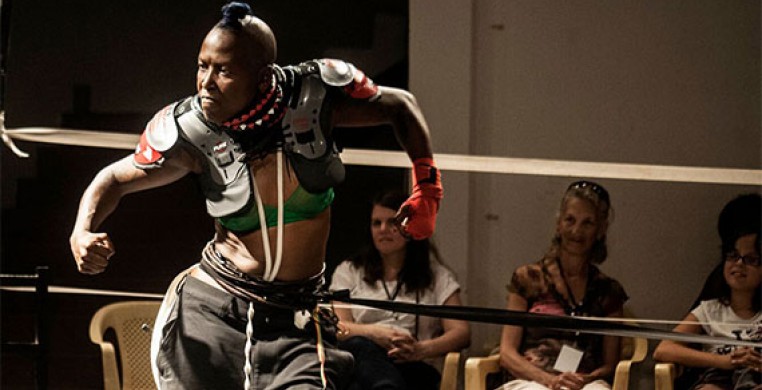“Turn your cell phones off,” shouts a fired up Nora Chipaumire, as the audience settles into their seats. “We are here to liberate the African — the black African, the ultimate manifesto.”
This particular manifesto, as Chipaumire calls it, is a profound tableau of African masculinity and weighty betrayals. In Portrait of Myself as My Father, now at the Dance Center through Saturday, the Zimbabwe-born performance artist is a brash, loud, dizzying character: she’s “chocolate thunder,” a “champion,” and in many respects, a rabble-rouser. She wears football pads and puffs her chest. She struts around with the swagger of a prizefighter. The lines blend between humor and intimidation.
Yet, most of what Chipaumire tries to be or how she wants to be perceived is loosely based on a rendering of her father, Webster, a man who abandoned her when she was just five years old. We learn later that Webster began life with everything and died with nothing: He’s a shadow of a shadow, a memory of a memory, pieced together through Chipaumire’s observations of African men more broadly, which is to say that much of what she seeks to understand relates to their shortcomings.
Turns out that she isn’t interested in liberating anyone. Instead, she hopes to give men a fighting chance. Set in a boxing ring and performed with two male collaborators, Portrait often evokes a boundless energy and a merciful kind of rage. The music is loud, the lights are bright and the sensory aspects can be overwhelming, even if they only happen in spurts (ushers hand out ear plugs to tamp down the bass).
This may be an attempt to throw people off, and it nearly does the trick until a third of the way through. That’s when you begin to realize that all these components are part of a progression doing its darnedest to make you uncomfortably aware of the questions that come later. Chipaumire notes in the program that her performance is less about her personal relationship with her father than it is “a portrait of a man who is nothing but a man of his time.” To be a black male in the 21st Century may be challenging, she continues, “To be a black, African father may be unattainable.”
On several occasions, Chipaumire is prone to wail into a microphone like a menacing DJ, spewing epithets like a gleeful, oblivious sidekick. She relishes the opportunities to encourage her barely-clothed collaborator, Pape Ibrahima Ndiaye, to believe his own legend, attached to his waist and egging him on as the “African James Bond,” the “King of Kings,” and the “Lord of Lords.” These prompts seem more like the seditious acts of a corrupt sub-conscience, prompting Ndiaye to begin thrusting his hips as though he were having random sex. By the time he’s finished, he looks exhausted and remorseful.
What’s striking about all this is that none of it comes off as vindictive or overly emotional; this isn't about condemnation or an unfulfilled confrontation. “If you don’t wanna fight,” she says to Ndiaye at one point, “you better learn how to run.” And so he does.

